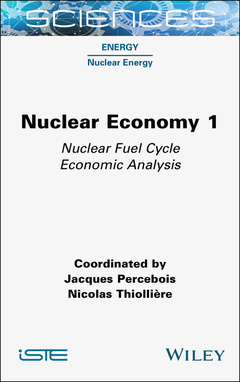Description
Nuclear Economy 1
Nuclear Fuel Cycle Economic Analysis
Coordinators: Percebois Jacques, Thiolliere Nicolas
Language: English
Subjects for Nuclear Economy 1:
· Hardback
Description
/li>Contents
/li>Biography
/li>
This book presents the factual, precise, complete and accessible economic elements of nuclear energy in order to contribute to an informed and dispassionate debate.
It begins with an in-depth analysis of the strategic policies relating to nuclear energy in France and around the world. The methodological aspects are presented exhaustively and illustrated with detailed examples and case studies.
This book provides a relevant economic study of the fuel component of nuclear energy. In this context, aspects of the uranium market are presented, before describing in detail the technical and economic components upstream of the nuclear cycle.
Preface ix
Sylvain DAVID, Jacques PERCEBOIS and Nicolas THIOLLIÈRE
Chapter 1 The Evolution of Nuclear Energy in the World and in France 1
Daniel IRACANE, Stéphanie TILLEMENT and Frédéric GARCIAS
1.1 Introduction 1
1.2 Nuclear power in the world 3
1.2.1 Creating long-term visibility seducing the market to invest: the case of the United Kingdom 4
1.2.2 Nuclear activities at the heart of State integration and at the service of economic diplomacy: the case of Russia 8
1.2.3 The concrete implications of political change: the case of South Korea 11
1.2.4 A new innovation paradigm at the service of reconquering the market: the case of the United States 13
1.2.5 The severe nuclear accident or the possibility of a sudden halt to the use of nuclear energy: the case of Japan 18
1.2.6 China: the emergence of an international leader 22
1.2.7 The need for multinational coherence in energy policies: the case of difficult European convergence 27
1.3 The trajectory of the French nuclear ecosystem, between continuity and rupture 33
1.3.1 The origins of French civil nuclear energy 35
1.3.2 French nuclear power in the industrial age 39
1.3.3 A story within a story: sodium-cooled fast reactors (SFRs) 40
1.3.4 The "white" years: the gradual decline of new projects 42
1.3.5 The painful emergence of a "nuclear revival" in France: projects, organizations and competencies 44
1.4 Conclusion 51
1.5 References 53
Chapter 2 Nuclear Costs: Methodological Aspects 55
Jean-Guy DEVEZEAUX DE LAVERGNE and Nicolas THIOLLIÈRE
2.1 Introduction 55
2.2 The different notions of costs 56
2.2.1 Nuclear costs and associated challenges 57
2.2.2 Defining the actors concerned by an economic question 57
2.2.3 Organizing cost concepts following a temporal logic 58
2.2.4 Specifying the scope of cost analyses 59
2.2.5 Choosing the appropriate calculation methods 63
2.2.6 Data 65
2.3 The discounted cost of nuclear electricity 66
2.3.1 Roles and challenges of economic calculation 67
2.3.2 Key preliminary concepts for calculating the LCOE 70
2.3.3 Calculation of the LCOE 73
2.4 Determining the discount rate 76
2.4.1 The three theoretical approaches 77
2.4.2 Values and effects of the discount rate 79
2.5 Case study: a new nuclear reactor 83
2.5.1 Reference scenario 83
2.5.2 Results 88
2.6 Conclusion 92
2.7 References 94
Chapter 3 The Production Costs of Nuclear Electricity 97
Jean-Guy DEVEZEAUX DE LAVERGNE
3.1 Introduction 97
3.2 Nuclear costs of existing reactors (Generation II) 98
3.2.1 Cost assessment methods for historical reactors 98
3.2.2 Existing fleet costs 104
3.3 Costs of nuclear electricity at the power station terminal 117
3.3.1 Construction costs of 3G water reactors 118
3.3.2 Financing terms and risks for parties 130
3.3.3 Changes in other components of the future nuclear cost 137
3.4 Overview of production costs of other nuclear technologies: SMR and FNR 142
3.4.1 SMR reactors 143
3.4.2 Fast neutron reactors 145
3.5 Electrical system costs and nuclear competitiveness 147
3.5.1 Calculation of system costs 149
3.5.2 Nuclear system costs 149
3.5.3 System costs and choice hierarchy 150
3.5.4 Competition, synergies and complementarities between nuclear and renewable energy 152
3.6 Conclusion 153
3.7 References 158
Chapter 4 The Costs of Nuclear Fuel 163
Cécile EVANS, Sophie GABRIEL, Christian POLAK and Philippe VALBUENA
4.1 The cost of fuel expressed in the LCOE 166
4.2 Uranium: availability and markets 169
4.2.1 Uranium consumption 169
4.2.2 Terminology, resources and reserves 171
4.2.3 Uranium resources 178
4.2.4 Secondary resources 184
4.2.5 The uranium market 186
4.2.6 Prospecting and exploration expenditures 200
4.3 From conversion to fuel fabrication 206
4.3.1 Conversion 206
4.3.2 Enrichment 214
4.3.3 Fuel design and fabrication 222
4.3.4 Development prospects: advanced ATF fuels 232
4.4 References 233
Appendix: Ore Deposits and Mining Projects 235
Sophie GABRIEL and Christian POLAK
List of Authors 241
Index 243
Summary of Volume 2 245
Jacques Percebois is Professor Emeritus at the University of Montpellier, France. He is the founder of both CREDEN and a master's degree in energy economics. He is also the author of several books on energy and has been a member of several national commissions on nuclear energy.
Nicolas Thiollière is a nuclear physicist and teacher-researcher at IMT Atlantique, France. He is also attached to the fundamental research laboratory, Subatech. He is a specialist in reactor and fuel cycle modeling.
These books may interest you

Advances in Nuclear Fuel Chemistry 242.37 €



